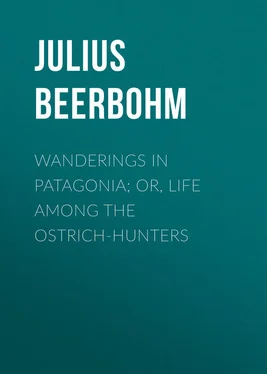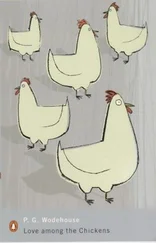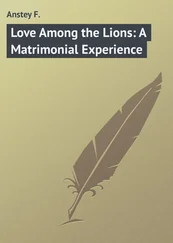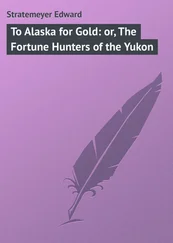Julius Beerbohm - Wanderings in Patagonia; Or, Life Among the Ostrich-Hunters
Здесь есть возможность читать онлайн «Julius Beerbohm - Wanderings in Patagonia; Or, Life Among the Ostrich-Hunters» — ознакомительный отрывок электронной книги совершенно бесплатно, а после прочтения отрывка купить полную версию. В некоторых случаях можно слушать аудио, скачать через торрент в формате fb2 и присутствует краткое содержание. Жанр: foreign_antique, foreign_prose, Путешествия и география, на английском языке. Описание произведения, (предисловие) а так же отзывы посетителей доступны на портале библиотеки ЛибКат.
- Название:Wanderings in Patagonia; Or, Life Among the Ostrich-Hunters
- Автор:
- Жанр:
- Год:неизвестен
- ISBN:нет данных
- Рейтинг книги:4 / 5. Голосов: 1
-
Избранное:Добавить в избранное
- Отзывы:
-
Ваша оценка:
- 80
- 1
- 2
- 3
- 4
- 5
Wanderings in Patagonia; Or, Life Among the Ostrich-Hunters: краткое содержание, описание и аннотация
Предлагаем к чтению аннотацию, описание, краткое содержание или предисловие (зависит от того, что написал сам автор книги «Wanderings in Patagonia; Or, Life Among the Ostrich-Hunters»). Если вы не нашли необходимую информацию о книге — напишите в комментариях, мы постараемся отыскать её.
Wanderings in Patagonia; Or, Life Among the Ostrich-Hunters — читать онлайн ознакомительный отрывок
Ниже представлен текст книги, разбитый по страницам. Система сохранения места последней прочитанной страницы, позволяет с удобством читать онлайн бесплатно книгу «Wanderings in Patagonia; Or, Life Among the Ostrich-Hunters», без необходимости каждый раз заново искать на чём Вы остановились. Поставьте закладку, и сможете в любой момент перейти на страницу, на которой закончили чтение.
Интервал:
Закладка:
The night seemed interminable. Occasionally I would get up, and walk to and fro to pass away the time quicker, but the cold soon drove me back to the fire. I confess I should have liked some companion to enliven my weary vigil. All alone in the wild desert, surrounded by the dark night, I felt quite an uncanny feeling come over me as I listened to the strange whisperings which seemed to creep through the grass and hover in the air, as the wind rose and swept down the narrow glen where I was camping. The more I listened the more these noises seemed to multiply, till at last there was quite a Babel of confused sounds and vague murmurings. Now and then I would start to my feet, fancying I heard voices close to me, or something would rustle mysteriously past, and a sound as of faint laughter would seem to ring from out the depths of the darkness around me. For a time I was kept in quite a state of nervous agitation; but it gradually wore off, and soon I became stolidly indifferent to everything except the fire, to replenish which from time to time I had to make an excursion in search of wood.
The hours went slowly by, as I sat watching the stars creeping over the heavens, longing wearily for daybreak. At last, worn out with fatigue, I fell into a troubled slumber, and when I opened my eyes again the sky was already grey with dawn. My fire had gone out, and my limbs were stiff with cold. On a bush near where I was lying four carranchos, a kind of hawk, were perched, eyeing me with a complacent, watchful look, as if they expected shortly to make a meal of me. Feeling quite uncomfortable under their unholy gaze, I flung a stone at them; but they merely flew up a little, circled once or twice round me, and then lighted again on another bush, as much as to say, 'Never mind; we can wait.' They abound in the pampas, and assemble in great numbers whenever a puma slays a guanaco, as the former often contents itself with merely sucking the blood of its victim, leaving the rest to these birds and the vultures, who soon pick the bones clean.
I rekindled the fire, and after I had warmed my stiffened fingers, I saddled the horse, which I had tethered to a bush during the night, and rode off towards the port. I arrived at the cove after about an hour's sharp riding, and found that my companions had also been obliged to pass the night in the open air, as their horses had eventually succumbed, under the fatigue consequent on their hard day's work.
CHAPTER III
During the next few weeks we were busy examining the country in the vicinity of St. Julian, without finding anything of special interest to reward our pains. Near the salt lake alluded to in the last chapter we discovered some extensive deposits of phosphate of lime, but as they are very far from the port, they must be considered to have practically no commercial value. Perhaps, however, when all the guanos and nitrates of more accessible regions have been exhausted, the phosphates of Patagonia may be utilised for manuring purposes, but in the interests of agriculture it is to be hoped that that day is as yet far distant.
St. Julian is a far superior harbour to either Chubut or Port Desire, but there is a dearth of fresh water in its vicinity during the months from October to June, which is of course a great drawback, and neutralises its other advantages. Indeed, the whole country is but sparsely watered. South of the Rio Negro, which must be considered as the dividing line between Patagonia and the Argentine Provinces, there are only small rivers, the Chubut, the Desire, and the Santa Cruz. Coy Inlet and Gallegos rivers during nine months of the year are unimportant streams, and the former at certain periods frequently dries up altogether.
The river Chubut has never been followed to its source by any trustworthy traveller, but Dr. Moreno, an Argentine explorer, from personal observations and from information obtained from the natives, is inclined to place its source as taken from a lake, called Coluguapé by the Indians, which lies somewhere between lat. 44° to 45° S., and long. 68° to 69° W., Greenwich. Thence it flows in a north-north-easterly direction till within about sixty miles from its mouth, and then, having received near this point the waters of several small streams from the Cordilleras, it flows from west to east, and finally empties itself into the Atlantic in lat. 42° 20′ S. The depth of the river at forty miles from its mouth varies from five to eight feet, according to the time of the year. Its current is not so rapid as that of most Patagonian rivers, but its extremely tortuous course makes it difficult to navigate. Its estuary forms a tolerably safe harbour for craft of light draught.
The Welsh Colony at Chubut, which numbers at present about 700 souls, was founded by the Argentine Government in 1865. It is not, and never has been, in a flourishing state; but this is due not so much to the unfertility of the Chubut valley as to the fact that most of the people sent out from Wales by the Government agent to form the proposed agricultural colony were miners, who of course knew nothing about farming matters. For a great many years the colonists were supported entirely by the Government, and on several occasions when accidents had happened to the vessels which were bringing stores for them from Buenos Ayres, they were saved from starvation by the Indians, who supplied them with guanaco and ostrich meat. At present the prospects of the colony are rather more hopeful: about 15,000 bushels of wheat were harvested last year; but even now the colony is not self-supporting, and costs the Argentine Government large sums annually for provisions and other assistance afforded the colonists.
South of Chubut lies Port Desire, formed by the estuary of the river, or rather stream, of that name. The Desire does not rise in spring and summer, like Gallegos and the other Patagonian rivers, to any great extent – a circumstance which makes it probable that it does not take its source in the Cordilleras, but rather from a chain of hills, which, according to Dr. Moreno, traverses the centre of Patagonia, running south-southwest from the Sierra de San Antonio, near the Gulf of San Matias. The Spaniards formed a colony at Port Desire, which, after having existed for a few years, was officially abandoned in 1807. The remains of a fort and some houses are still standing near the port, as well as some apple and cherry trees, with which the climate of Patagonia seems to agree very well.
I pass over the incidents of the rest of my sojourn at St. Julian, as having no relevancy to the object of this work. Suffice it to say that by the little Government schooner which makes two or three voyages annually from Buenos Ayres to the Rio Negro and Santa Cruz, and which on this occasion put into St. Julian to bring us our correspondence, I received some letters, conveying important news, which made my speedy return to Buenos Ayres imperative. About the same time a party of ostrich-hunters, attracted by the smoke of our fires, came to St. Julian from Santa Cruz, partly out of curiosity to see the unusual visitors, and partly to trade for biscuits and tobacco. They did not stop long; and as they were going back to Santa Cruz, and from there to Sandy Point in the Straits of Magellan, where I should be able to take a steamer for Buenos Ayres, I embraced this favourable opportunity, and packing up a few things, started off with my new acquaintances.
We had not gone far, however, when it commenced to rain; and there being no particular object in getting wet, we halted for the day, and took shelter under our tent, hoping that by the next morning it would be fine again. In this hope we were disappointed; it rained incessantly for about four days, during which we of course remained where we were, and very tired I soon got of it. The ground was as damp as could be, and so loosened by the moisture that the stakes of our tent gradually gave, and the slack canvas being no longer water-tight, little pools of water gathered round the furs and saddle-cloths which served us in lieu of bedding, permeating them with a general dampness, which made our nightly slumbers rather uncomfortable. The daytime we passed cowering round the fire, with some covering thrown over our backs to keep off the rain, the front part of the body requiring no extra covering, for as fast as it was wetted it dried by the fire, which for this purpose was allowed to assume formidable dimensions. Under such unfavourable circumstances, conversation rather flagged, as may be imagined, being limited to occasional prophecies and conjectures as to when the weather might be expected to change for the better. But in revenge, the tobacco-pipe and the maté-pot went round the circle without any intermission, and during the days of forced inaction consequent on the rain, we consumed startling quantities of those two almost indispensable commodities of pampa life.
Читать дальшеИнтервал:
Закладка:
Похожие книги на «Wanderings in Patagonia; Or, Life Among the Ostrich-Hunters»
Представляем Вашему вниманию похожие книги на «Wanderings in Patagonia; Or, Life Among the Ostrich-Hunters» списком для выбора. Мы отобрали схожую по названию и смыслу литературу в надежде предоставить читателям больше вариантов отыскать новые, интересные, ещё непрочитанные произведения.
Обсуждение, отзывы о книге «Wanderings in Patagonia; Or, Life Among the Ostrich-Hunters» и просто собственные мнения читателей. Оставьте ваши комментарии, напишите, что Вы думаете о произведении, его смысле или главных героях. Укажите что конкретно понравилось, а что нет, и почему Вы так считаете.












